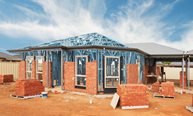Claiming depreciation for common property
Common property assets within strata property entitle investors to substantial depreciation deductions. All strata title properties contain different assets and have unique ownership arrangements, so it's important the depreciation deductions get apportioned correctly.
A strata title is used when investors own part of a property usually called a 'lot'. This can be a unit, duplex or townhouse complex which shares ownership of common property including driveways, foyers and gardens. Common property assets can include items like air conditioners, fire safety equipment, lifts, lights and garbage bins.
An investor's entitlement to shared assets within strata property is calculated based on their percentage of ownership. Experts such as BMT Tax Depreciation can review the property's entitlements within the Strata Plan, Building Unit Plans and Plan of Subdivision to determine the exact percentage of ownership. This percentage ensures every depreciation deduction is captured.
Common property depreciates in the same way as any other part of the property. Plant and equipment assets in common property will depreciate according to their effective lives, which are determined by the Australian Taxation Office. Capital works allowance relates to the structural portion of common property and depreciates over 40 years. This rate typically depends on the property's construction date and the building's purpose.
Shared assets also often fall into a low-value pool or will qualify for an immediate write-off. This allows Quantity Surveyors to apply accelerated depreciation rates to most assets found in common areas. If an owner's interest in a common property asset is less than $1,000, the asset can be pooled and claimed at a rate of 18.75 per cent in the year of purchase and 37.5 per cent each year thereafter. If an owner's interest in an asset is less than $300, the asset qualifies for an immediate write-off.
Common property will be impacted by the changes to the rules for deductions for decline in value of second-hand depreciating assets in rental properties. That is, from 1 July 2017, you cannot claim a deduction for the decline in value of second hand depreciating assets in a residential rental property unless you are using the property in carrying on a business or you are an excluded entity (a corporate entity, superannuation fund that is not a Self Managed Super Fund, a public unit trust, a managed investment fund or a unit trust or a partnership if each of its members are one the aformentioned types of entities). However, you will still be able to claim the decline in value of new assets and the capital works deduction for all assets.
Let's look at an example
The owner of a newly built $595,000 two-bedroom, two-bathroom apartment, purchased from the developer, can claim common property assets like lifts, ventilation fans, carpet, intercom system assets and air conditioning. The table highlights the apportioned value of each asset, the depreciation rates and the first and second year deductions available.

The owner's portion of the carpet and intercom system each have a value less than $1,000 so they can qualify for a low-value pool with accelerated depreciation. The air conditioning has a calculated value less than $300, so the investor can claim the full amount in the first financial year.
In this scenario, the investor would be able to claim more than $1,200 in depreciation deductions from common property assets in the first and second year. Given there are likely to be more common property assets, like garbage bins, hot water systems and gym facilities, the investor could be entitled to thousands of dollars more.
In addtion, there may be common property capital works items, such as swimming pools, carports etc for which the capital works deduction of 2.5% can be claimed, irrespective of whether the apartment was purchased from the developer or puchased from a previous owner.
To find out more about how depreciation can help you, contact BMT on 1300 728 726.




.png?width=55&height=48&ext=.png)
-1.svg)

